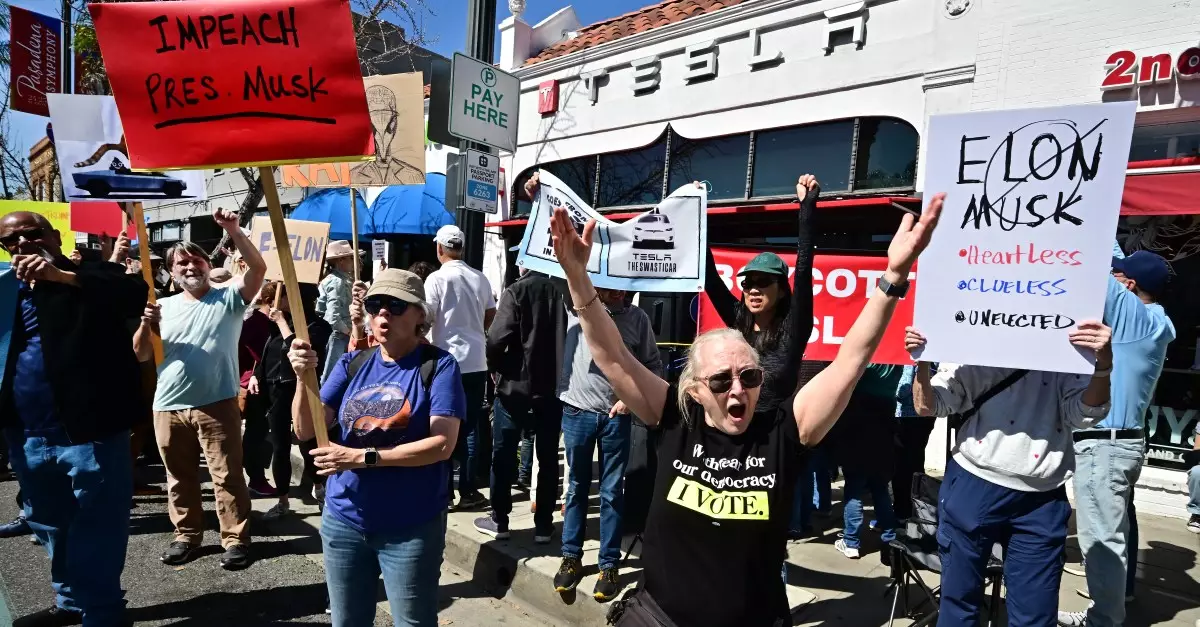A wave of activism is sweeping across the globe as organizers mobilize for what they are promoting as “the biggest day of action” against Tesla and its CEO, Elon Musk, by planning protests on March 29th at all 277 Tesla showrooms and Supercharger stations. This movement, which started modestly in February, has rapidly escalated into a coordinated effort that spans hundreds of locations worldwide. Social media platforms and grassroots organizing have helped fuel the momentum, demonstrating the power of unified voices against perceived corporate malfeasance and political maneuvering.
Tesla, once a beacon of electric revolution and technological innovation, now finds itself in the crosshairs of protestors who accuse Musk of dismantling federal assistance programs and perpetuating government redundancy through questionable policies. The demonstrations hinge on the belief that Musk’s actions go against the best interests of both his customers and the broader community. Waving placards and chanting slogans, activists expose their grievances with passion, striving to make their voices heard in an increasingly polarized political climate.
Direct Challenges to Authority: Musk vs. The People
Central to the protests is a sentiment of disillusionment with Musk’s perceived abandonment of the principles that initially defined Tesla’s mission. Musicians, filmmakers, lawmakers, and civil rights activists are coming together to articulate their dissatisfaction, framing Musk’s actions as detrimental to democracy and social equity. The incursion of politics into the business world has only emboldened the protestors, led by figures like Alice Hu from Planet Over Profit, who stated that Elon Musk’s antics—whether they involve online rhetoric or real-world policy changes—should not deter citizens from exercising their rights.
While Musk has become a polarizing figure, the protestors maintain that their movement is fundamentally nonviolent. Leaders come equipped with calls for peaceful assembly, vigorously emphasizing their dedication to legality and moral integrity. This stands in stark contrast to the claims of some officials in the Trump administration, who have labeled the unrest as domestic terrorism amidst claims of increased violence, arson, and vandalism linked to the protests. The erroneous conflation of peaceful protest with violence only serves to galvanize more supporters to the cause, showcasing the trickiness of defining dissent in today’s political discourse.
Stock Slumps Amid Growing Threats
The recent dive in Tesla’s stock price has undoubtedly invigorated these demonstrations, as protestors hope to drive the company’s valuation further down. As Tesla grapples with increased competition and dwindling demand, discontent transforms into a tangible strategy for activists, who believe that financial pressure could lead to broader accountability for Musk. Amidst calls to “kill the Tesla brand,” speakers like investigative journalist Micah Lee have articulated a clear vision: hurt Musk’s financial interests to prompt necessary change.
Musk’s wealth—largely built upon Tesla’s stock value—adds another layer to the narrative. As the richest man in the world, he holds unprecedented sway, and his financial muscle allows him to navigate political waters with relative ease. By targeting the company’s market performance, protestors employ a tactic that seeks not just to express dissatisfaction, but to enact meaningful change in governance and corporate behavior.
Struggles for Civil Liberties in a Hostile Climate
As the protests intensify, legal experts urge demonstrators to familiarize themselves with the laws governing protest activities within their states. There is a tension between the desire for civil liberties and the state’s attempts to quell dissent. Even as national rhetoric shifts and certain activities are characterized as terrorist threats, the narrative crafted by activists is one of resilience and persistence. The broader civil rights context informs their strategy, underscoring demands for democracy and equality.
Lauren Regan, an attorney with the Civil Liberties Defense Center, highlights that many laws targeting protestors may be deemed unconstitutional, suggesting a fraught balance between rights and restrictions. The symbolic nature of these protests extends beyond Musk’s influence; it taps into a larger struggle against dominance and authoritarianism in any form. Activists become torchbearers for accountability, continuing her call to resist intimidation and to remain steadfast in the pursuit of justice.
Elon Musk’s Controversial Standing
Musk’s existing status as a corporate titan, intertwined with political favoritism, leaves a profound impact on the efficacy of protest strategies. As activists contend with a reality in which market forces and political power interlace, they face an uphill battle. Observers, including academics like Joan Donovan, note how Musk’s approach to media and political engagement appears detached from the everyday experiences of average citizens.
His habitual penchant for memes and social media banter has created a unique cult of personality that complicates conventional frameworks for activism. Musk’s ability to engineer his presence and political influence makes the complications of activism in the current climate exceedingly challenging while underscoring the need for a nuanced understanding of modern dissent.
The resistance unfolding against Tesla is not merely a condemnation of one man but is emblematic of a much larger fight against corporate control over democratic processes. As protests strengthen and gather global support, they serve as a clarion call to not only challenge Musk but to hold all entities accountable in the evolving landscape of power and privilege.

